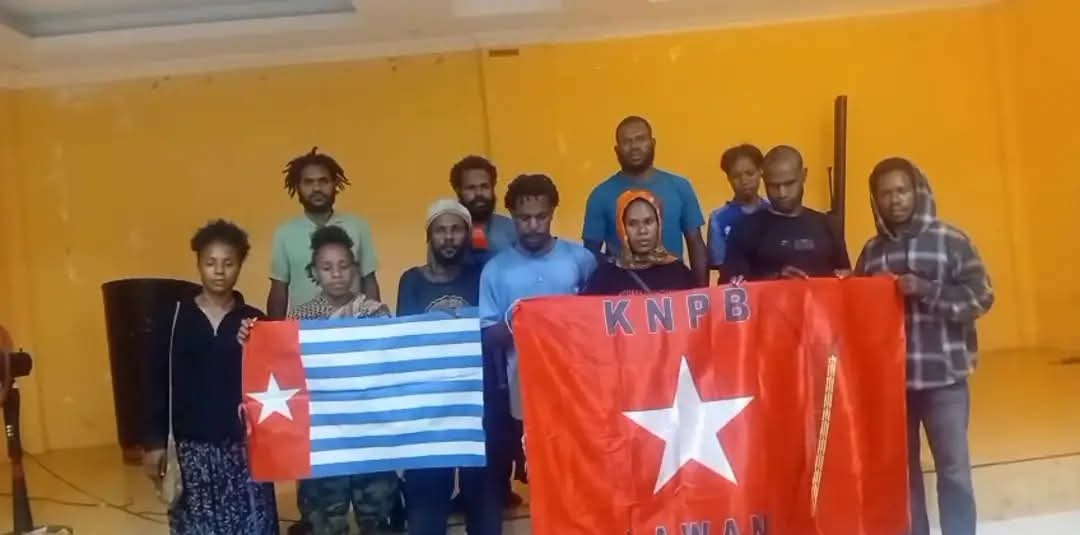KNPB Makassar Marks 15 Years of Resistance with Political Reflections and Demands
MAKASSAR, RAKYAT NEWS – In commemoration of the 15th anniversary of the West Papua National Committee (KNPB) Consulate in Makassar, members of the organization held a reflective discussion aimed at evaluating their long-standing struggle in what they describe as “colonial territory.”
The event also served to affirm the continued existence and resilience of the KNPB Makassar Consulate despite growing threats and pressures.
KNPB (Komite Nasional Papua Barat) is a peaceful pro-independence organization that was established in 2008. Its main goal is to advocate for the right of the people of West Papua to determine their own future through a democratic referendum. KNPB operates primarily through nonviolent means such as public demonstrations, political education, and campaigns to raise awareness about human rights violations in Papua.
The group rejects Indonesia’s rule over Papua, which it considers a form of colonial occupation, and instead calls for international attention and intervention. While the Indonesian government often accuses KNPB of separatism and links it to security threats, KNPB insists that its activities are rooted in peaceful resistance and democratic principles.
KNPB is a Papuan grassroots movement fighting for self-determination, human rights, and freedom through nonviolent political activism.
The session included a historical overview titled “The Formation of KNPB and the Six Regional Consulates Across Indonesia,” highlighting the committee’s journey and persistence in advocating for the rights of the Papuan people. The gathering was attended by students and activists who reaffirmed their commitment to the movement.
In a statement delivered by the KNPB Makassar spokesperson, Jeck Matuan, the group extended its congratulations on the anniversary and emphasized the importance of staying consistent in the fight for the fundamental rights of the Papuan people amid systemic oppression.
“Continue being a light and a beacon of hope for the people. Stand firm against injustice, because history will only remember those brave enough to stand up,” Matuan declared, urging all members and supporters to maintain the spirit of resistance.
As part of the anniversary event, KNPB Makassar also issued a series of political demands directed at the Indonesian government. These demands reflect concerns over human rights violations, racial discrimination, and suppression of democratic freedoms in Papua.
Among their primary demands are an end to intimidation and harassment of Papuan students in Makassar and other Indonesian cities, the immediate halting of corporate exploitation in Papua, and the release of all Papuan political prisoners. They also called for open access to foreign journalists and the cessation of scapegoating KNPB.
KNPB urged the Indonesian government to withdraw all organic and non-organic military forces from Papua, stop all forms of racial abuse toward Papuan students, and provide legal protection to civilians displaced by conflict in the region.
Additionally, the organization demanded the prosecution of all human rights violators in Papua and the establishment of a genuine democratic space across Indonesia, particularly in West Papua. A core message of their political stance is the call for the right to self-determination as the only democratic solution for the Papuan people.
The event concluded with passionate calls of solidarity: “Long live students, long live women, long live the Papuan people.” With the final words, “Revolutionary greetings – we must bring this to an end,” KNPB Makassar reaffirmed its mission to continue advocating for justice, equality, and Papuan independence.
Meanwhile, Indonesian government representatives, including officials from Military Regional Commad (Kodam) Hasanuddin and South Sulawesi Police (Polda Sulsel), did not respond to requests for comment. South Sulawesi Police spokesperson Kombes Didik and Kodam public relations officer Lt. Col. Gatot Awan had not issued any statements as of the time this report was published. (Uki Ruknuddin)


Tinggalkan Balasan Batalkan balasan